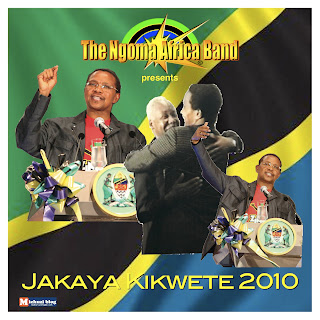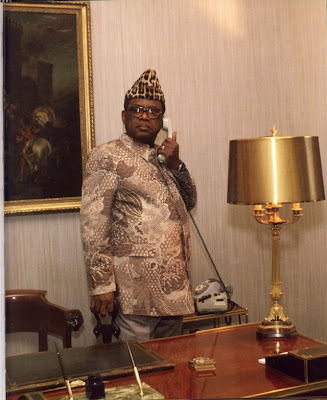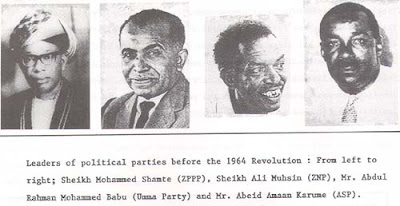Hivi ndivyo makulaji ya watoto mashule Bongo-Tanzania yanavyotayarishwa...
Wednesday, October 27, 2010
Tuesday, October 26, 2010
GROWING UP AFRICAN
TAFADHALI NENDA KWENYE LINK HIYO YA MAANDISHI YA RANGI NYEKUNDU UJIONEE KAZI NZURI YA KIJANA JOHNSON!!!
Monday, October 25, 2010
Ni jukumu letu kuwajengea mazingira mazuri hawa watoto wetu kwani wao ndio Taifa la kesho! Tazama jinsi wengi wao wanavyokwenda mashuleni bila hata viatu na hata wafikapo mashuleni inabidi wasaidie kuchota maji na madarasani wanakaa wamebanana. Mimi nakataa kuamini kabisa ya kwamba katika miaka karibu 50 ya kujipatia uhuru, haya yote hatuyaoni... Elimu na huduma za Afya ni wazi kabisa ya kwamba hazijapewa kipaumbele. Ujengaji wa mashule katika kila kata sio jawabu! Kuna tofauti kubwa kati ya "Quantity na Quality". Tukiendelea kupuuzia elimu basi tujue wazi kwamba taifa litadidimia!!!
Sunday, October 24, 2010
Some Africans, poor no more, hit by new diseases
The medical experts gathered from around Africa to talk about a continentwide epidemic, but it wasn't AIDS or malaria — it was diabetes, and the bad habits that often bring it on.
A growing urban middle class is defying the image of Africa as poor, underfed and under-medicated. And with the comforts of middle class life, afflictions familiar in the West are making inroads here too — obesity, diabetes, lung cancer, strokes, heart disease.
A continent that traditionally traveled on foot or by bicycle now increasingly rides cars and buses. More time is spent at desks. Elevators are replacing stairs. White-collar Africans are discovering the gym.
"In the past, we used to exercise without knowing it," South Africa's health minister, Aaron Motsoaledi, reminded the recent conference.
"You would walk a long distance to school. You would walk a long distance to work. You would walk a long distance to the shops," Motsoaledi, 52, recalled of his childhood. "But now I'm an African whose child is dropped at the gate of the school in a car, then picked up at the end of the day and put in front of the TV..."
In West Africa, Cameroonians who once ate rice only as a holiday treat are loading their plates with it, crowding out the vegetables their parents ate. Down south, Malawians say fast foods are a status symbol.
In Nairobi, Kenya, a sobering chat with his doctor got 27-year-old Robel Demissi to the gym. "My blood pressure had gone up, a bit more than last year, and my weight was eight kilograms (17 pounds) more. That's a lot," he says.
Demissi, a pilot for a Kenyan airline, blames his weight gain on junk food and a workload that leaves little time for exercise. But lest he flunk his physical and lose his flying license, he has taken up a Thai martial art and has lost six kilograms (15 pounds) in two months.
"I never used to have the time to train," he said, "but now I have two motivating factors to make the time: my job and my life."
All over the world, these lifestyle diseases tend to go hand in hand with urbanization and industrialization, and the results are felt in rising obesity rates and related illnesses. But they are all the more unwelcome in Africa, which already struggles with AIDS and malaria.
"These countries are really faced with a double burden," said Dr. Timothy Armstrong, an expert on chronic diseases with the U.N. World Health Organization. How, he wonders, is a doctor treating AIDS or malaria to find time to lecture patients about watching their weight?
Armstrong wants African governments to follow the West's lead with tobacco taxes and pressure on the food industry to cut salt and sugar content. But awareness often is lacking.
Fatima Macuacua, 31, owns a grocery store in Maputo, capital of Mozambique, and refuses to believe her favorite fast foods could be bad for her.
"Cancer, diabetes, high blood pressure and other diseases are not a big problem for Africans," she insists. "Maybe for Europeans."
more basic than gluten and trans fatty acids. A sharp rise in bread prices triggered riots in Maputo this year.
But free-market reforms have given Mozambique growth rates as high as 10 percent a year, meaning a boom for some, and gyms have sprouted in the capital.
The rise of lifestyle diseases is too recent for solid statistics to exist. Kenyan health authorities say only this year did they start counting cases of obesity and fatal heart attacks and strokes. But at least the problem is getting attention.
Kenyan cardiologist Elijah Ogola says his own observations convince him there's a problem and is especially worried about the patterns being set for children, who are less active than their parents were at their age.
"Generally our lives are so crowded that if you can afford to exercise you do not have the time to," Ogola said in an interview. "You get into a matatu (bus), into the lift (elevator), and sit at your desk."
Dr. Jean Claude Mbanya, president of the International Diabetes Foundation, said urban planners could help, for example, by designing car-free zones where Africans can rediscover walking.
Mbanya said that 15 years ago in his homeland, Cameroon, 5 percent of adults had conditions pointing to developing diabetes later in life and 1.2 percent already had the disease. Ten years later, he said, the figures were 9 percent and 7 percent. Mbanya's foundation estimates 12 million sub-Saharan Africans have diabetes — and estimates the number will double by 2030 to become the world's hardest-hit region.
Researchers writing recently in the New England Journal of Medicine said chronic diseases such as diabetes account for 60 percent of all deaths worldwide, and 80 percent of those are in poorer countries, where younger people in their prime working years are most vulnerable.
Mbanya, 52, recalled that a child, he only ate rice on Christmas, and a trip into town meant walking, sometimes for days.
Now, he said, rice is eaten every day. City dwellers no longer grow their vegetables, and they rarely exercise.
Jimmy Sagawa, a chef for a hotel chain in Malawi, said people are starting to see eating out as trendy, dismissing traditional foods like nsima, or corn porridge.
"Our women have forgotten the art of cooking that their mothers taught them," Sagawa said. "They think taking the family to eat out is a symbol of the high life."
Or, as Johannesburg veterinarian Ida Mulenga puts it, "if you're eating McDonald's in your house, it means you've got money in your house."
South Africa, with the continent's most developed economy, has stood out in addressing the threat of lifestyle diseases. An increase in cigarette taxes has been linked to a decline in smoking and smoking-related diseases since the 1990s. Smoking is banned in public places, a novelty in Africa, and legislation is being drafted to limit artery-clogging trans fats in food.
Still, the Heart and Stroke Foundation of South Africa estimates a third of the men and more than half the women here are overweight or obese.
From Cape Town's Groote Schuur Hospital, where the world's first heart transplant was performed, comes research showing that South African deaths from diabetes were up 38 percent between 1999 and 2006, and heart disease up 20 percent.
Mulenga, the Johannesburg vet, is 35 and works out regularly at a gym. In 2008 she ran her first 10-kilometer (6 mile) road race. She says she got inspiration from a friend, Orah Bessit, a retired saleswoman who grows her own vegetables, walks and runs and is now a youthfullooking 66.
Bessit recognizes that staying healthy requires sacrifices, so she has given up hamburgers and switched from white bread to whole-grain.
"When I started eating whole-grain bread, it was like sawdust," she said. "But I had to get used to it, for my health. Because if you eat healthy, you live long, without all of these diseases."
Wednesday, October 20, 2010
Monday, October 18, 2010
Tuesday, October 12, 2010
African leaders buying human albino parts: group
A lobby group says politicians are involved in the trade of human albino body parts in Africa and use them as charms to bring them good fortune.
Albino body parts are sold for hundreds and sometimes thousands of dollars in parts of Africa. Coumba Makalou, president of the U.S.-based Salif Keita Global Foundation, a group that advocates for albinos' rights, says those who pay for body parts include rich businessmen and politicians looking to improve their political fortunes.
Makalou says body parts sell for as much as $2,000. At least 57 albinos have been killed in Tanzania and 14 in Burundi since 2007. Thousands of albinos are estimated to live in hiding.
The killings are fueled by superstitious beliefs that human albino body parts will bring wealth and success.
Monday, October 11, 2010
Ndugu Waheshimiwa,Wananchi Mabibi na Mabwana!!!!
Katika kipindi hiki cha kuelekea katika uchaguzi mkuu,
Usikose kutumia nafasi hii kwa kujipatia zawadi ya nyimbo mbili
maarufu kwa jina la "JAKAYA KIKWETE 2010" nyimbo hizo unapewa bure
kwa mda wa wiki 3 unaweza kuzipata at http://www.unheardradio.com/The_Ngoma_Africa_band
au www.unheardradio.com/The_Ngoma_Africa_band kwa kobofya katika tuvoti hiyo unaweza kusikiliza
na kupata kopi ya nyimbo hizo na pia usikose kuungana na ujumbe uliomo katika nyimbo hizo kwamba
"Jakaya Kikwete 2010.
Ndugu wananchi msikose kutumia offer hii na nafasi kwa wakati huu muhafaka
Saturday, October 9, 2010
Friday, October 8, 2010
CHAMA CHA JUMUIYA YA WA-TANZANIA NEW YORK.
Well kwa wananchi tunaoishi jijini New York na vitongoji vyake kama New Jersey, na Connecticut tunapenda kuwakaribisha sana kujiunga na chama kipya ambacho kipo njiani kupatiwa usajili. Ni chama ambacho kipo wazi kwa wa-Tanzania wote bila kujali dini, kabila wala rangi au location. I understand kwamba tumekuwepo hapa mjini kwa muda mrefu sana bila ya chama kinachoeleweka na kukubalika na wengi, yaani sisi wananchi. Sasa ninaamini wakati ni huu sasa tukawa na chama kinachowajumuisha wananchi wote wa mjini hapa na vitongoji vyake. Chama tayari kina viongozi wa muda na kinatayarisha uchaguzi mkuu wa viongozi wake wa kudumu, utakaofanyika February, mwakani 2011 kwa tarehe itakayosemwa baadaye, kwa maelezo zaidi unaweza kupitia: info@nycmetro.org au Jumuiya ya wa-Tanzania NY @Facebook.
Naibu Katibu Mkuu (Interim).
William Malecela.
Naibu Katibu Mkuu (Interim).
William Malecela.
Thursday, October 7, 2010
WILLIAM MALECELA "MUTU" COMING TO FUNDIWAKOMBO BLOG
@ NEW YORK
WELL, heshima mbele sana kwa wananchi na wapenzi wote wa Fundiwakombo Blog, kwa heshima na taadhima leo naomba kukubali mualiko kutoka kwa mmiliki wa hii blog, a longtime friend Bwana Fundi, kuja hapa kushirikiana naye na nyinyi pia katika kueleweshana na kuelemishana kuhusu yanayojiri katika maisha yetu ya kila siku. Kuanzia habari za nyumbani Tanzania na hata ya nje ya nchi yetu na hasa katika kipindi hiki cha uchaguzi wa Taifa letu. Ninaomba kukaribia na kuwakaribisha pia, karibuni sana na tupo pamoja sana hapa kuanzia leo.
Wasalaam.
William Malecela.
Wednesday, October 6, 2010
Sunday, October 3, 2010
Friday, October 1, 2010
Subscribe to:
Comments (Atom)


























.jpg)
.jpg)
.jpg)






















